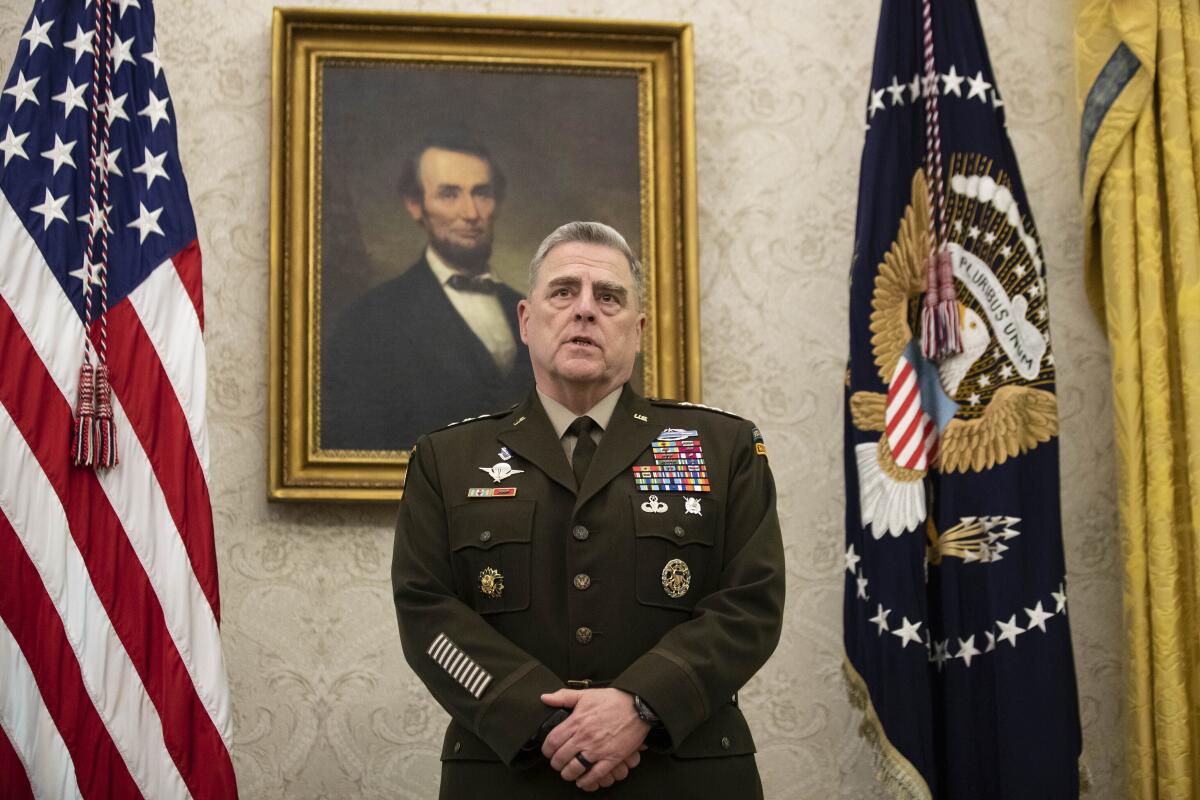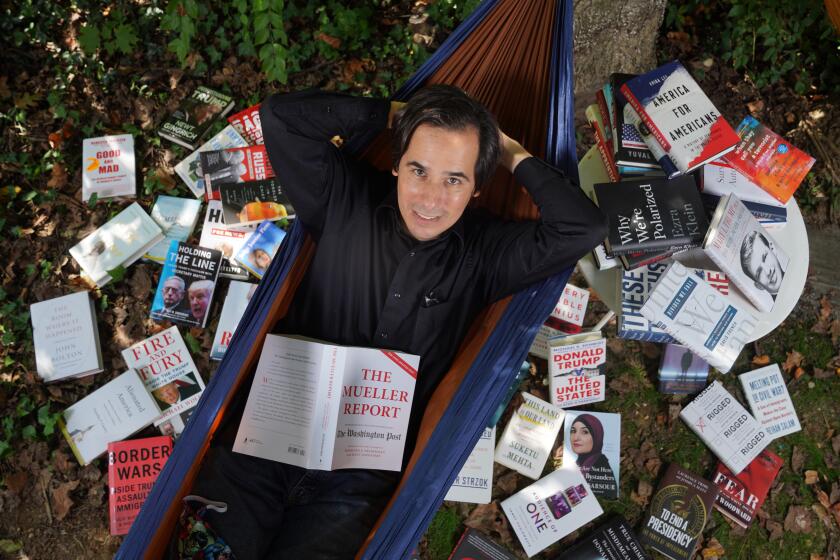Review: ‘Peril’ is a damning — and tedious — portrait of American democracy on the brink

On the Shelf
Peril
By Bob Woodward and Robert Costa
Simon & Schuster: 512 pages, $30
If you buy books linked on our site, The Times may earn a commission from Bookshop.org, whose fees support independent bookstores.
First came “Fear.” Then came “Rage.” Now there’s “Peril,” the third book from Bob Woodward about President Trump’s chaotic tenure in the White House.
Unlike the first two, this one was written with a coauthor, Washington Post political reporter Robert Costa. But despite the additional name on the cover, “Peril” remains unmistakably a “Woodward book.” It’s the product of hundreds of interviews that the authors have strip mined to produce fly-on-the-West-Wing-wall accounts of key moments.
It’s also tedious, spending more time stacking up anecdotes like bricks than generating new insights into a presidency that has already received exhaustive coverage. Reading “Peril” is as much of an endurance test as the reporting behind it must have been.
The book covers Trump’s final stretch in office, from his erratic management of the coronavirus crisis to his shambolic attempts to overturn the election. The details that have garnered the most headlines involve Joint Chiefs Chairman Mark Milley, who reportedly feared that Trump would order desperate military operations as he pushed American democracy to the brink.
Milley called his Chinese counterpart to assure him no sneak attacks were in the works, and he reviewed protocols for launching nuclear weapons in hopes of preventing a first strike. The effort was reminiscent of the way national security aides quietly severed the chain of command leading to an unstable President Nixon shortly before his resignation in 1974.
A parallel storyline focuses on Joe Biden, depicting his emergence from grief over his eldest son’s death to mount a presidential campaign that proved his doubters wrong. Biden takes office three-quarters of the way through the book, shifting the narrative center of gravity toward his adjustment to a job he had sought for most of his career.
Woodward’s journalism helped bring down Richard Nixon. But “Rage” it too ploddingly neutral and enamored of access to make a dent in this fallen age.
It’s a lot of ground to cover. Reading “Peril” creates the sensation of riding a speeding train as scenes flash by outside the windows. Robert S. Mueller III finishes the Russia investigation. Whoosh. Biden wins the South Carolina primary. Whoosh. Trump gets COVID. Whoosh.
The book is 512 pages long, filleted into 72 chapters plus a prologue, epilogue and index. The effect is less propulsive than disorientating. In a single paragraph, the authors cover Biden offering the chief of staff job to Ron Klain and his first presidential debate with Trump. Whoosh. Whoosh. Whoosh.
Things slow down after the election, when the authors hit their stride as they describe Trump’s attempts to hold onto power. His lawyers circulate nonsensical memos about voter fraud and unconstitutional schemes to change the election result. Sen. Lindsey Graham reportedly denounces the documents as “third-grade” writing, noting, “I can get an affidavit tomorrow saying the world is flat.”
The authors describe Vice President Mike Pence as flirting with ways to satisfy his enraged boss; they also report that he called Dan Quayle to find out — “veep to veep” — if there was “even a glimmer of light, legally and constitutionally, to perhaps put a pause on the certification.” As he prepared for his role overseeing the process on Jan. 6, he asked, “Can I perhaps express sympathy with some of the complaints?”

The night before the certification, Trump and Pence confront each other in the Oval Office. In this scene, it’s not Trump’s rage but his attempt at seduction that’s most unnerving. Gesturing to crowds of supporters outside the White House calling for the election to be overturned, Trump says, “If these people say you had the power, wouldn’t you want to?”
When Pence demurs, Trump insists. “But wouldn’t it be almost cool to have that power?”
The explosion of violence on Jan. 6 feels inevitable, and the events remain as shocking on the page as they were when they occurred.
This genre of political book aspires to cinematic storytelling, but piecing together these scenes is challenging under the best of circumstances. Often there are only a handful of people in the room where it happens — people who care deeply about how they will be perceived by voters, contemporaries, historians or potential employers.
The result feels like an oral history told by people jockeying to burnish their reputations after years of scandal.
Annette Gordon-Reed, Ayad Akhtar, Héctor Tobar, Martha Minow, David Kaye and Jonathan Rauch discuss the Jan. 6 riot and what we do about it.
No one comes out looking better than Milley, who seems to have fashioned himself as an unelected defender of American government. While talking with Secretary of State Michael R. Pompeo during the presidential transition, Milley reportedly says, “We’ve got a plane with four engines and three of them are out. We’ve got no landing gear. But we’re going to land this plane and we’re going to land it safely.”
The authors describe Milley as “burly and ramrod straight.” (That appears to be the requisite description of a military leader. In “Rage,” Woodward wrote that Defense Secretary James N. Mattis had “a stoic Marine exterior and attention-getting ramrod posture.”) Milley is also portrayed as studious, his shelves brimming with “hundreds of thick books just on China.” (Left undocumented is whether they’re leatherbound or if his home smells of rich mahogany.)

After the Capitol riot, Milley took some time alone to write down his thoughts in a notebook. “It came almost like a brainstorm,” the book says. “On the January 6 riot, he wrote, ‘What is this amorphous thing that just happened on the 6th? Who are these people?”
Then Milley makes a list — “Nazis, Proud Boys, The Oath Keepers, Newsmax” — and concludes with the phrase, “Big Threat: domestic terrorism.”
It’s the quintessential “Woodward book” scene, reflecting access to the country’s most powerful people as they do something mundane. The reader is granted no additional wisdom about these threats, apart from learning that Milley has a list of them somewhere.
Another such scene comes as Biden begins planning ways to accelerate vaccine distribution. Jeff Zients, who leads his coronavirus task force, works with his team to “put together a comprehensive spreadsheet of all the federal agencies and subagencies” to figure out where they can find more resources. Then inspiration strikes. “FEMA! It was a big ‘aha’ moment.”
The final quarter of the book feels like the beginning of another, as Biden adjusts to life in the White House — he calls it “the tomb” as he pines for his family home in Delaware — and starts to push his agenda in Washington. It reads like the minutes from a very long meeting.
Carlos Lozada read 150 books on Donald Trump for his history, “What Were We Thinking.” He shares surprising insights and lets you know what’s fake news.
So who is this book for? It’s unlikely to appeal to the casual voter, who’s probably burned out on presidential drama, or to satisfy the political junkie, who knows most of the key stories already. No, this book is for the completist who won’t be satisfied until they know what Trump’s campaign staff was eating in which room of the White House when the election results started rolling in. (Spoiler alert — pizza and Chick-fil-A in the Roosevelt Room.)
Near the end of “Peril,” Trump’s exiled campaign manager, Brad Parscale, drops a hint that could double as a coming attraction for the authors.
“He had an army. An army for Trump. He wants that back,” Parscale says. “I don’t think he sees it as a comeback. He sees it as vengeance.”
“Vengeance,” coming in 2024 to a bookstore near you?
More to Read
Sign up for our Book Club newsletter
Get the latest news, events and more from the Los Angeles Times Book Club, and help us get L.A. reading and talking.
You may occasionally receive promotional content from the Los Angeles Times.










